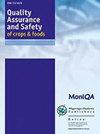不同杀菌方法对风味蟹肉酱感官品质及挥发性风味的影响
IF 5.3
3区 农林科学
Q1 FOOD SCIENCE & TECHNOLOGY
引用次数: 4
摘要
风味蟹肉酱是一种营养丰富、风味独特的新型水产调味品。然而,人们对杀菌方法如何影响FCMS的感官质量和挥发性风味知之甚少。在本研究中,罐装FCMS采用以下杀菌方法:巴氏杀菌(PS)、微波杀菌(MS)、超声波杀菌(US)和高温杀菌(HTS)。根据灭菌后观察到的FCMS中的质地、颜色、感官评分、挥发性风味和总活菌数对每种灭菌方法进行评估。结果表明,PS、MS、US和HTS处理后,总活菌数分别降至28、26、58和18CFU/g;在这些样品中均未检测到大肠菌群。PS和MS对FCMS的织构没有显著影响(P>0.05),但US和HTS降低了FCMS的硬度和粘度。MS和HTS显著降低了FCMS的L*、a*和b*值(P<0.05)。PS和US后FCMS的原始亮度和红色值保持不变。MS和HTS在很大程度上降低了FCMS的感官评分,而PS和US保持了FCMS原始的感官评分。对不同灭菌处理后FCMS的挥发性风味特征的评估表明,MS和HTS降低了FCMS中的总酯含量,而US降低了FCMS中的醇总量。然而,PS不仅保持了FCMS中酯的原始总量,而且增加了醇、醛和酮的含量。因此,在四种不同的杀菌方法中,PS可以被选为FCMS的一种可行的杀菌方法。本文章由计算机程序翻译,如有差异,请以英文原文为准。
Effect of different sterilization methods on sensory quality and volatile flavor of flavor crab meat sauce
Flavor crab meat sauce (FCMS) is a new type of aquatic condiment that is not only rich in nutrition but also unique in terms of flavor. However, very little is known about how sterilization methods affect the sensory quality and volatile flavor of FCMS. In the present study, canned FCMS was subjected to the following sterilization methods: pasteurization (PS), microwave sterilization (MS), ultrasonic sterilization (US), and high temperature sterilization (HTS). Each sterilization method was evaluated on the basis of texture, color, sensory score, volatile flavor, and total viable counts in FCMS observed after sterilization. Results demonstrated that the total viable count decreased to 28, 26, 58, and 18 CFU/g respectively after PS, MS, US, and HTS treatments; no coliform group was detected in any of these samples. PS and MS had no significant effect on the texture of FCMS (P > 0.05), but US and HTS reduced hardness and viscosity of FCMS. MS and HTS significantly reduced the L*, a*, and b* values of FCMS (P < 0.05). The original brightness and red value of FCMS remained the same after PS and US. MS and HTS reduced the sensory score of FCMS to a great extent, while PS and US maintained the original sensory score of FCMS. Assessment of volatile flavor profile of FCMS post different sterilization treatments revealed that MS and HTS reduced the total ester content, while US reduced the total amount of alcohols in FCMS. However, PS not only maintained the original total amount of esters in FCMS, but also increased the content of alcohols, aldehydes, and ketones. Therefore, PS could be selected as a feasible sterilization method for FCMS among the four different sterilization methods.
求助全文
通过发布文献求助,成功后即可免费获取论文全文。
去求助
来源期刊

Quality Assurance and Safety of Crops & Foods
FOOD SCIENCE & TECHNOLOGY-
CiteScore
4.60
自引率
7.50%
发文量
61
审稿时长
1 months
期刊介绍:
''Quality Assurance and Safety of Crops & Foods'' is an international peer-reviewed journal publishing research and review papers associated with the quality and safety of food and food sources including cereals, grains, oilseeds, fruits, root crops and animal sources. It targets both primary materials and their conversion to human foods. There is a strong focus on the development and application of new analytical tools and their potential for quality assessment, assurance, control and safety. The scope includes issues of risk assessment, traceability, authenticity, food security and socio-economic impacts. Manuscripts presenting novel data and information that are likely to significantly contribute to scientific knowledge in areas of food quality and safety will be considered.
''Quality Assurance and Safety of Crops & Foods'' provides a forum for all those working in the specialist field of food quality and safety to report on the progress and outcomes of their research.
 求助内容:
求助内容: 应助结果提醒方式:
应助结果提醒方式:


